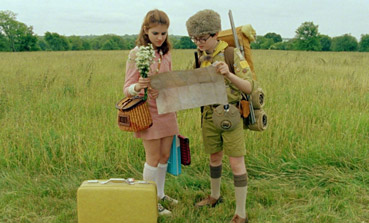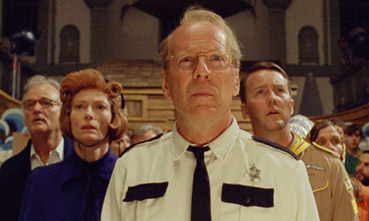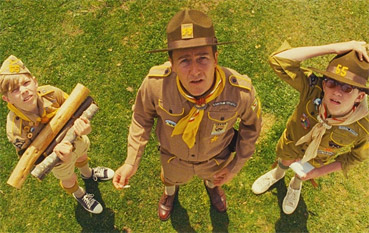"In the case of this movie, it was the feeling of falling in love
for the first time," Anderson says. "That feeling of being like
a fifth grader who is suddenly overwhelmed with this fixation
on somebody two rows over and three seats up." |
Writer/Director, Wes Anderson |
That's a potent memory for all of us. It's said that everyone remembers their first (no, not that first); the first time you became aware that something unfamiliar and powerful had hold of you. To feed that almost instant obsession with another human being, you have to eat with your eyes as much as you could as often as you could, sometimes furtively. The mere sight of the object of affection nourishes you, excites you and while sex and procreation may be the eventual point of all of this swooning and fantasy wooing, if you're young enough (and raised in a culture not continually vomiting out sex from every screen, magazine and billboard) the fixation has an intensity and purity to it. I was so nervous in front of the object of my utter fascination when in the sixth form, I paid a friend a hot-dog to take her photograph and yes, I am well aware of the Freudian analysis that might provoke. But I still have the photo... You may have scoffed (the hotdog certainly was) but I can remember what I was wearing when I met my very first crush in a field near our school (and of course, her full name) a good forty odd years ago. You can no more understand what's happening in your mind and body than you can figure out how British Rail organises its fare system. Yes, it's that mysterious. It's also utterly wonderful and Wes Anderson catches that elusive feeling in a simple, little movie that runs deep.

The odds weren't exactly stacked heavily against this quirky (see later for the fate of that particular word) but emotionally satisfying film-maker. Yes, his movies are still gloriously eccentric and can only exist in Andersonland but when you have a stellar cast like this, you've taken out enough insurance. If you see this movie with no knowledge beforehand, you spend a lot of its running time going "Is that "major star"? Yes, it is!" The story is relatively simple. It's 1965 in a New England island town. Sam, a young boy, is in foster care having lost his parents. He escapes his Scout troop and meets Suzy, a girl who appears to be slightly older than him. After a prearranged meeting planned for a whole year via letters, the two aim to have a ten-day adventure camping out and following an old Indian trail. Love blossoms while every adult connected to the pair quietly melts down in worry and morbid self-regard. A resident Narrator gives us the geographical and meteorological information we need to frame the tale and it's all a question of what happens when everyone meets up and then, what will become of the young lovers?
Hey, this is Wes Anderson. It's not quite that straightforward. His oeuvre is distinctive and hugely entertaining and he's not given up on a certain style of direction. On Moonrise, Anderson's in a straight line and 90 degree mood. Great sweeping vertical and horizontal tracking shots and a few 360 degree pans patter out of his box of tricks. It's hard at first not to be overtly aware of the director's role in the proceedings but his self conscious mise-en-scene either settles down or as an audience you get used to it. Emotionally, there is no question whose side you are on. Although we get to see very little of the two leads' past lives, we are asked to believe that Sam (Jared Gilman) is the most unpopular of all the Scouts in his troop (was it the trauma at his parents' death making him surly and not a team player?) and that Suzy (Kara Hayward) is a deeply troubled child. We get no real evidence of this 'trouble' she causes but it's clear from the context of her family that she's very much the outsider. She lives with parents who conduct their every relationship and interaction in a staccato of lawyer-speak that is amusing, surprising and somewhat formal. "Does it concern you that your daughter's run away from home?" asks Suzy's mother. Her father sticks his head out of an upstairs window, his answer saying a lot about his relationship with his children... "That's a loaded question."

Bill Murray plays Suzy's father with a proud pot belly, much confusion and angst. This marital relationship is fraying at the edges and Suzy's mother (played by Outsider favourite Frances McDormand) is furtively wandering into the arms of the local police chief (Bruce Willis). Willis is playing a variation on his put-upon husband role in Death Becomes Her. He does weary very effectively and in some respects redeems his character as an action hero of sorts. That's the essential key to this movie, action.
This is not Spider-man vs. Doctor Octopus slugging it out on a train action or giant Avengers alien tadpoles overkill. It is action as the antithesis of passivity. Every adult in this movie suffers from a nuanced inability to move forward. Wouldn't it be great if there were a word for that condition? How about 'stalled', stunted emotionally and in some cases physically. They are living lives that have no compass. This, of course, is the exact opposite of Sam and Suzy whose entire relationship is based on literal forward movement (with compass and map essential parts of their baggage). Given my thoughts about how far Anderson himself was prepared to go (I admit to wanting our extremely young friends not to become lovers – "Too young," my inner moral watchdog was screaming), but how their physical relationship is handled is nothing short of a miraculous balancing act. You could say the two leads act balancing. I expected to have a problem. If I'd read the scenes on paper I wouldn't have believed any director, or child actor for that matter, would be able to pull them off. Anderson does and we are comfortable about it because the children have no hang ups about what they're doing. It's another metaphor for exploration (something we should all be doing every day) and as such it's a real winner. I'm sure there will be a few reactions of nervousness like my own over one or two suggestive scenes but it's all done in a context of safety and personal trust that eliminates the sordid with an artistic flourish.
Despite both children's social awkwardness towards family and outsiders, they connect profoundly with each other. They are of a kind, a kind that sees with kinder eyes. They are two pinballs bouncing off unfriendly and uncomprehending people until they realise that they are magnetically attracted to each other. Outsiders unite. Once one is appreciated by the other, small previously locked boxes of potential start to fly open. In that wonderful intoxication of first love, how would you have felt if it was reported that it was requited with some enthusiasm? You can feel it in your belly now, can't you? Does it get any better than that?

Meanwhile, back at the camp (I enjoyed writing that without shame) the Scout Leader is having a crisis. Seeing Edward Norton in this role reminded me just how good this guy is. The most emotional and oddly moving moment of the entire movie belongs to him (and it's not the fire incident) and for a grown man to play any role in a Scout uniform says enough about his bravery let alone his one shot cameo as a job-done, sexual servant in Sacha Baron Cohen's The Dictator. All the adult characters are 'in charge' in one way or another and none fits the uniform with anything approaching ease. The only grown up with self confidence and comfort in his own skin is the Narrator played by a favourite of this reviewer, Bob Balaban. It's he who figures out what path the children are taking and he who stands alone while all the other adults bicker and torment each other born from guilt and a sense of helplessness. Authority is provided by the wonderful Tilda Swinton, her name? 'Social Services'. She's essentially playing the Wicked Witch of the Government but does it with gusto and assuredness. Anderson regular Jason Schwarzman turns up as a Scout 'fixer' and kudos to all the actors who manage to convince, even in Andersonland, a singuar location of this and his other quirky movies.
OK. Stop. Let's mortally wound the word 'quirky' and bury the bastard while it's still twitching. My dictionary says this about the word 'quirky'...
"characterized by peculiar or unexpected traits"
Well, OK. It's just that I feel whenever we (as in the critical community) approach any film-maker with any originality we have to tar him/her with the quirky brush unless his unique quality is married to über-action and/or violence (then I think the overused words are 'gritty' and 'uncompromising'). But it is true that the whole style of Anderson's films is notably self conscious (characters look directly at the camera/audience) and at times it's directorially neon-throbbed ("Just look how I'm directing this!") but somehow this works in a way that in the hands of any other other film-maker it would come across as exact but over-contrived. I just have to look at any photo of Anderson (and he looks just like his movies suggest he might look!) and I know he's going to get away with it. He's on the cover of June's Sight & Sound, every inch the innocent even in a Scout's uniform.
There's an animal death in this film – almost an arbitrary one. And aside from the fact that a British audience's sympathies are immediately roused, it passes as something that just happened accidentally. Our two young stars' reaction to it is suitably melancholic but then (rightly) they nod at the moment and then "Action!", they move forward once more. There are all sorts of pleasing thematic knot-tying – electric shock therapy may be the fate of the orphan boy Sam who then gets struck by lightning – and surreal silliness that pops up unannounced. A wonderful top shot looks down at Sam as he is chased by a mob. Not one of the group figure out that if they just stopped running Sam would eventually circle and run back into those he was fleeing. There is a massive and somewhat unrealistic change of heart in the film but it's necessary and emotionally rewarding. There was also a moment of reconciliation that never came between two characters linked by their professions but it didn't wound the film in any way.
As with The Darjeeling Limited, Anderson's co-writer is Roman Coppola (and I will not be so indelicate to serve up the usual "Isn't he the son of/cousin of/brother of" shtick that may give readers the impression that he was born into the film industry). I will simply say that regardless of privilege or opportunity, the man has written a beautiful screenplay with the director that plays at times charming knocking on twee and rugged, fanciful and above all sincere. All things considered, Moonrise Kingdom (a tricky title to remember for me for some reason, I keep writing Moonlight) has not only a big heart but it's in the right place. The helplessness of the adult characters is a nice contrast with the go-getting, pro-active children (whose views of life are far less cluttered than their guardians' and they have no trace of Hollywood brat DNA). Wes Anderson has bull's eyed again with a film that could only come from his unique point of view.
|